《大学英语读写》课程教学资源(A)Ⅱ_大学英语读写(A)Ⅱ_四级考试材料_2014年6月四级真题及答案详解
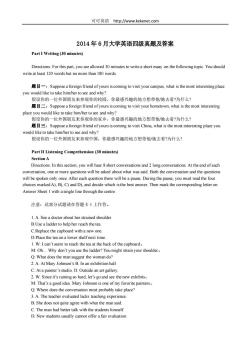
可可英语http:/www.kekenet.com 2014年6月大学英语四级真题及答案 Part I Writing(30 minutes) Directions:For this part,you are allowed 30 minutes to writea short essay on the following topic.You should write at least 120 words but no more than 180 words. -:Suppose a foreign friend of yours iscoming to visit your campus,what is the most interesting place you would like to take him/her to see and why? 假设你的一位外国朋友来参观你的校园,你最感兴趣的地方想带他/她去看?为什么? :Suppose a foreign friend of yours iscoming to visit your hometown,what is the most interesting uld like to take him/her t nd why? 一位外国朋友来参观你的家乡,你最感兴趣的地方想带他/她去看?为什么? Supposea foreign friend of yours is coming to visit China,what is the most interesting place you would like to take him/her to see and why? 假设你的一位外国朋友来参观中国,你最感兴趣的地方想带他/她去看?为什么? Part II Listening Comprehension(30 minutes) Section A Directions:In this section.you will hear 8 short conversations and 2 long conversations.At the end of each conversation,one or more questions will be asked about what was said.Both the conversation and the questions choices k)B).C)ad D),and decide which isthe best Answer Sheet 1 with asingle line through the centre 注意:此部分试题请在答题卡1上作答 1.A.See a doctor about her strained shoulder B.Use a ladder to help her reach the tea C.Replace the cupboard with a new one d.Place the tea on a lower shelf next time 1.W:I can't seem to reach the tea at the back of the cupboard M:Oh.Why don't you use the ladder?You might strain your shoulder. oman do? C.At a painter's studio.D.Outside an art gallery. 2.W:Since it's raining so hard.let's go and see the new exhibits M:That's a good idea.Mary Johnson is one of my favorite painters Q:Where does the conversation most probably take place? B.She does not quite agree with what the man said. C.The man had better talk with the students himself. D.New students usually cannot offer a fair evaluation
可可英语 http://www.kekenet.com 2014 年 6 月大学英语四级真题及答案 Part I Writing (30 minutes) Directions: For this part, you are allowed 30 minutes to write a short essay on the following topic. You should write at least 120 words but no more than 180 words. 题目一:Suppose a foreign friend of yours is coming to visit your campus, what is the most interesting place you would like to take him/her to see and why? 假设你的一位外国朋友来参观你的校园,你最感兴趣的地方想带他/她去看?为什么? 题目二:Suppose a foreign friend of yours is coming to visit your hometown, what is the most interesting place you would like to take him/her to see and why? 假设你的一位外国朋友来参观你的家乡,你最感兴趣的地方想带他/她去看?为什么? 题目三:Suppose a foreign friend of yours is coming to visit China, what is the most interesting place you would like to take him/her to see and why? 假设你的一位外国朋友来参观中国,你最感兴趣的地方想带他/她去看?为什么? Part II Listening Comprehension (30 minutes) Section A Directions: In this section, you will hear 8 short conversations and 2 long conversations. At the end of each conversation, one or more questions will be asked about what was said. Both the conversation and the questions will be spoken only once. After each question there will be a pause. During the pause, you must read the four choices marked A), B), C) and D), and decide which is the best answer. Then mark the corresponding letter on Answer Sheet 1 with a single line through the centre. 注意:此部分试题请在答题卡 1 上作答。 1. A. See a doctor about her strained shoulder B.Use a ladder to help her reach the tea. C.Replace the cupboard with a new one. D.Place the tea on a lower shelf next time. 1. W: I can’t seem to reach the tea at the back of the cupboard。 M: Oh. Why don’t you use the ladder? You might strain your shoulder。 Q: What does the man suggest the woman do? 2. A. At Mary Johnson’s B. In an exhibition hall C. At a painter’s studio. D. Outside an art gallery. 2. W: Since it’s raining so hard, let’s go and see the new exhibits。 M: That’s a good idea. Mary Johnson is one of my favorite painters。 Q: Where does the conversation most probably take place? 3. A. The teacher evaluated lacks teaching experience. B. She does not quite agree with what the man said. C. The man had better talk with the students himself. D. New students usually cannot offer a fair evaluation
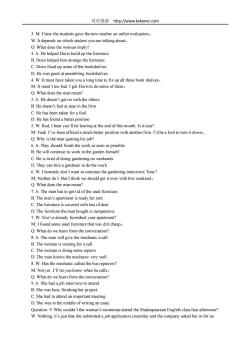
可可英语http:/www.kekenet.com 3.M:I hear the students gave the new teacher an unfair evaluation W:It dependson which youare Q:What does the woman imply? 4.A.He helped Doris build up the furniture B.Doris helped him arrange the furniture. C.Doris fixed up some of the bookshelves 4.W.tmust have taken you lng time to shelves. M:It wasn't too bad.I got Doristo do some of them O:What does the man mean? 5 a He doesn't get on with the others B.He doesn't feel at ease in the firm D.He has found a better position. 5.W:Rod.I hear you'll be leaving at the end of this month.Is it true? M:Yeah.I've been offered a much better position with another firm.I'd be a fool to turn it down. O:Why is the man quitting his iob? 6.A.They should finish the C.He is tired of doing gardening on weekends d.They can hire a gardener to do the work. 6.W:I honestly don't want to continue the gardening tomorrow.Tony? M:Neither do I.But I think we should get it over with this weekend. Q:What does the man mean? 7.A.The man has to get rid of the used furniture B.The man's apartment is ready for rent C.The furniture is covered with lots of dust. D.The furniture the man bought is inexp ensiv 7.W:You've already furnished v M:Ifound some used furiture that was dirt cheap O:What do we learn from the conversation? 8.A.The man will give the mechanic acall. B The woman is waiting for a call C.The woman is doings D.The man knows the mechani very well. 8.W:Has the mechanic called the bus repairers? M:Not yet.I'll let you know when he callsa O:What do we learn from the conversation? 9.A.She had ajob interview to attend. B.She was busy finishing her proje C.She had to attend an important meeting. D.She was in the middle of writing an essay Question:9.Why couldn't the woman's roommate attend the Shakespearean English class that afternoon? W:Nothing.it's just that she submitted ajobapplication yesterday and the company asked her infor an
可可英语 http://www.kekenet.com 3. M: I hear the students gave the new teacher an unfair evaluation。 W: It depends on which student you are talking about。 Q: What does the woman imply? 4. A. He helped Doris build up the furniture. B. Doris helped him arrange the furniture. C. Doris fixed up some of the bookshelves. D. He was good at assembling bookshelves. 4. W: It must have taken you a long time to fix up all these book shelves。 M: It wasn’t too bad. I got Doris to do some of them。 Q: What does the man mean? 5. A. He doesn’t get on with the others. B. He doesn’t feel at ease in the firm. C. He has been taken for a fool. D. He has found a better position. 5. W: Rod, I hear you’ll be leaving at the end of this month. Is it true? M: Yeah. I’ve been offered a much better position with another firm. I’d be a fool to turn it down。 Q: Why is the man quitting his job? 6. A. They should finish the work as soon as possible. B. He will continue to work in the garden himself. C. He is tired of doing gardening on weekends. D. They can hire a gardener to do the work. 6. W: I honestly don’t want to continue the gardening tomorrow, Tony? M: Neither do I. But I think we should get it over with this weekend。 Q: What does the man mean? 7. A. The man has to get rid of the used furniture. B. The man’s apartment is ready for rent. C. The furniture is covered with lots of dust. D. The furniture the man bought is inexpensive. 7. W: You’ve already furnished your apartment? M: I found some used furniture that was dirt cheap。 Q: What do we learn from the conversation? 8. A. The man will give the mechanic a call. B. The woman is waiting for a call. C. The woman is doing some repairs. D. The man knows the mechanic very well. 8. W: Has the mechanic called the bus repairers? M: Not yet .I’ll let you know when he calls。 Q: What do we learn from the conversation? 9. A. She had a job interview to attend. B. She was busy finishing her project. C. She had to attend an important meeting. D. She was in the middle of writing an essay. Question: 9. Why couldn’t the woman’s roommate attend the Shakespearean English class that afternoon? W: Nothing, it’s just that she submitted a job application yesterday and the company asked her in for an
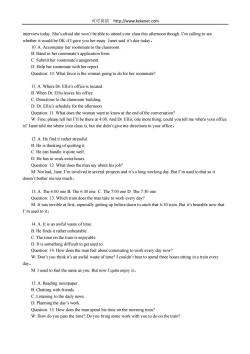
可可英语http:/www,kekenet.com interview today.She'safraid she won't be able to attend your class this afternoon though.I'm calling to see whether it would be OK ifI gave you Janet sd it'sdue today. 10.A.Acc mpany her roommate to the classroom B.Hand in her roommate's application form. C.Submit her roommate's assignment. D.Help her roommate with her report. Question:10.What favor is the woman going to do for her roommate? 11.A.Where Dr.Ellis's office is located B.When Dr.Ellis leaves his office. C.Directions to the classroom building. D.Dr.Ellis's schedule for the afternoor eee And Dr o ore tin ould youtll me where yoro woman want to kno at the end of the conversation? is?Janet told me where your class is.but she didn't give me directions to your office. 12 A He find it rather stressful B.He is thinking of quitting it. C.He can w. D.He has to work extra hours. Question:12.What does the man say about his job? M:Not bad,Jane.I'm involved in several projects and it's a long working day.But I'm used to that so it doesn't bother me too much. 13.A.The 6:00 one B.The6:30 one.C.The 7:00one D.The 7:30 one Question:13.Which train does the man take to work every day? M:It was terrible at first,especially getting up before dawn to catch that 6:30 train.But it's bearable now that I'm used to it。 14.A.It is an awful waste oftime B.He finds it rather unbearable. C.The time on the train is eniovable D.It is something difficult to get used to. Question:14.How does the man feel about commuting to work every day now? W:Don'tyou think it'san day。 M:I used to feel the same as you.But now I quite enjoy it. 15.A.Reading newspaper B.Chatting with friends C.Listening to the daily news. D.Planning the day's work. Question:15.How does the man spend his time on the morning train? W:How do you pass the time?Do you bring some work with you to do on the train?
可可英语 http://www.kekenet.com interview today. She’s afraid she won’t be able to attend your class this afternoon though. I’m calling to see whether it would be OK if I gave you her essay. Janet said it’s due today。 10. A. Accompany her roommate to the classroom. B. Hand in her roommate’s application form. C. Submit her roommate’s assignment. D. Help her roommate with her report. Question: 10. What favor is the woman going to do for her roommate? 11. A. Where Dr. Ellis’s office is located. B. When Dr. Ellis leaves his office. C. Directions to the classroom building. D. Dr. Ellis’s schedule for the afternoon. Question: 11. What does the woman want to know at the end of the conversation? W: Fine, please tell her I’ll be there at 4:00. And Dr. Ellis, one more thing, could you tell me where your office is? Janet told me where your class is, but she didn’t give me directions to your office。 12. A. He find it rather stressful. B. He is thinking of quitting it. C. He can handle it quite well. D. He has to work extra hours. Question: 12. What does the man say about his job? M: Not bad, Jane. I’m involved in several projects and it’s a long working day. But I’m used to that so it doesn’t bother me too much。 13. A. The 6:00 one B. The 6:30 one. C. The 7:00 one D. The 7:30 one Question: 13. Which train does the man take to work every day? M: It was terrible at first, especially getting up before dawn to catch that 6:30 train. But it’s bearable now that I’ m used to it。 14. A. It is an awful waste of time. B. He finds it rather unbearable. C. The time on the train is enjoyable. D. It is something difficult to get used to. Question: 14. How does the man feel about commuting to work every day now? W: Don’t you think it’s an awful waste of time? I couldn’t bear to spend three hours sitting in a train every day。 M: I used to feel the same as you. But now I quite enjoy it。 15. A. Reading newspaper. B. Chatting with friends. C. Listening to the daily news. D. Planning the day’s work. Question: 15. How does the man spend his time on the morning train? W: How do you pass the time? Do you bring some work with you to do on the train?
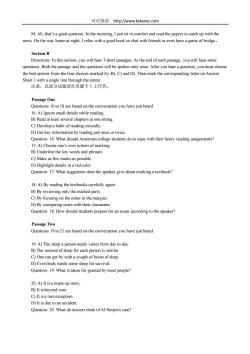
可可英语http:/www.kekenet.com M:Ah that's a good question.In the morning i iust sit in comfort and read the papers to catch up with the news On the way home at night,I relax with a good book or chat with friends or even have a game of bridge Section B Directions:In this section,you will hear 3 short passages.At the end of each passage,you will hear some questions.Both the passage and the questions will be spoken only once.After you hear aquestion,you must choose the best answer from the four choices markedA).B).C)and D).Then mark the corresponding letter on Answer Sheet 1with asingle ough the 注意:此部分试题请在答题卡1上作答 Passage one Questions based on the conversation you have just heard. 16.A)Ignore small details while reading B)Read at least several chapters at one sitting. C)Develop a habit of reading critically. D)Get key information by reading just once or twice Question:16.What should American college students do to cope with their heavy reading assignments? 17.A)Choose one's ow ystem of marking C)Make as few marks as possible. D)Highlight details ina red color. Question:17.What suggestion does the speaker give about marking a textbook? 18.A)By reading the textbooks carefully agair B)By reviewing only the marked parts C)By focusing on the notes in the margins D)By comparing notes with their classmate Question:18.How should students prepare for an exam according to the speaker? Passage Two Questions 19 to21 are based on the conversation you have just heard. 19.A)The sleep a person needs varies from day to day. B)The amount of s pfor each pe is similar C)necan get by ith co of hoursof sep D)Everybody needs some sleep for survival. Question:19.What is taken for granted by most people? 20.A)It isa made-up story B)Itisbeyond cure. C)It is a rare exception D)It is due toan accident. Question:20.What do doctors think ofAl Herpin's case?
可可英语 http://www.kekenet.com M: Ah, that’s a good question. In the morning, I just sit in comfort and read the papers to catch up with the news. On the way home at night, I relax with a good book or chat with friends or even have a game of bridge。 Section B Directions: In this section, you will hear 3 short passages. At the end of each passage, you will hear some questions. Both the passage and the questions will be spoken only once. After you hear a question, you must choose the best answer from the four choices marked A), B), C) and D). Then mark the corresponding letter on Answer Sheet 1 with a single line through the centre. 注意:此部分试题请在答题卡 1 上作答。 Passage One Questions 16 to 18 are based on the conversation you have just heard. 16. A) Ignore small details while reading. B) Read at least several chapters at one sitting. C) Develop a habit of reading critically. D) Get key information by reading just once or twice. Question: 16. What should American college students do to cope with their heavy reading assignments? 17. A) Choose one’s own system of marking. B) Underline the key words and phrases. C) Make as few marks as possible. D) Highlight details in a red color. Question: 17. What suggestion does the speaker give about marking a textbook? 18. A) By reading the textbooks carefully again. B) By reviewing only the marked parts. C) By focusing on the notes in the margins. D) By comparing notes with their classmates. Question: 18. How should students prepare for an exam according to the speaker? Passage Two Questions 19 to 21 are based on the conversation you have just heard. 19. A) The sleep a person needs varies from day to day. B) The amount of sleep for each person is similar. C) One can get by with a couple of hours of sleep. D) Everybody needs some sleep for survival. Question: 19. What is taken for granted by most people? 20. A) It is a made-up story. B) It is beyond cure. C) It is a rare exception. D) It is due to an accident. Question: 20. What do doctors think of Al Herpin's case?
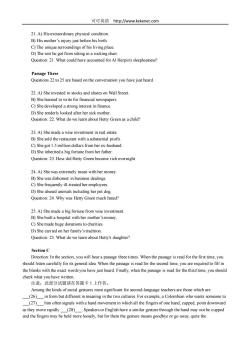
可可英语http:/www.kekenet.com 21 A)Hisextraordinary physical condition B)Hismother's injury just before his birth. C)The unique surroundings of his livingplace D)The rest he got from sitting in a rocking chai Question:21.What could have accounted for Al Herpin's sleeplessness? PassageThree Questions 22 to25 are based on the conversation you have just heard 22.A)She invested in stocks and shares on Wall Street. B)She learned to write for financial newspapers. C)She developed a strong interest in finance sick mothe 8 bou Hety Green证 23.A)She made a wise investment in real estate. B)She sold the restaurant with a substantial profit C)She got 1.5 million dollars from her ex-husband Question:23.How did Hetty Green become rich overnight 24.A)She was extremely mean with her money B)She was dishonest in business dealings D)She abused animals including her pet dog Question:24.Why was Hetty Green much hated? 25.A)She made a big fortune from wise investment B)She built a hospital with her mother'smoney C)She made huge donations tocharitie D)She carried on her family's tradition Question:25.What do we learn about Hetty's daughter? Section C Direction:In the,you will hear a passage threetimes.When the passage is read for the first time,you should listen carefully for its general idea.When the passage is read for the second time.you are required to fill in the blanks with the exact words you have just heard.Finally.when the passage is read for the third time.you should check what you have written. 注意:此部分试题请在答题卡1上作答。 Among the kinds of socia gestures most significant for scond-anguage teachersare those which are (26)in form but different in meaning in the two cultures For example,a Colombian who wants someone to (27)him often signals with a hand movement in which all the fingers of one hand,cupped,point downward as they move rapidly (28).Speakers or English have a similar gesture through the hand may not be cupped and the fingers may be held more loosely,but for them the gesture means goodbye or go away,quite the
可可英语 http://www.kekenet.com 21. A) His extraordinary physical condition. B) His mother’s injury just before his birth. C) The unique surroundings of his living place. D) The rest he got from sitting in a rocking chair. Question: 21. What could have accounted for Al Herpin's sleeplessness? Passage Three Questions 22 to 25 are based on the conversation you have just heard. 22. A) She invested in stocks and shares on Wall Street. B) She learned to write for financial newspapers. C) She developed a strong interest in finance. D) She tenderly looked after her sick mother. Question: 22. What do we learn about Hetty Green as a child? 23. A) She made a wise investment in real estate. B) She sold the restaurant with a substantial profit. C) She got 1.5 million dollars from her ex-husband. D) She inherited a big fortune from her father. Question: 23. How did Hetty Green become rich overnight 24. A) She was extremely mean with her money. B) She was dishonest in business dealings. C) She frequently ill-treated her employees. D) She abused animals including her pet dog. Question: 24. Why was Hetty Green much hated? 25. A) She made a big fortune from wise investment. B) She built a hospital with her mother’s money. C) She made huge donations to charities. D) She carried on her family’s tradition. Question: 25. What do we learn about Hetty's daughter? Section C Direction: In the section, you will hear a passage three times. When the passage is read for the first time, you should listen carefully for its general idea. When the passage is read for the second time, you are required to fill in the blanks with the exact words you have just heard. Finally, when the passage is read for the third time, you should check what you have written. 注意:此部分试题请在答题卡 1 上作答。 Among the kinds of social gestures most significant for second-language teachers are those which are _(26)_ in form but different in meaning in the two cultures. For example, a Colombian who wants someone to _(27)_ him often signals with a hand movement in which all the fingers of one hand, cupped, point downward as they move rapidly _(28)_ .Speakers or English have a similar gesture through the hand may not be cupped and the fingers may be held more loosely, but for them the gesture means goodbye or go away, quite the
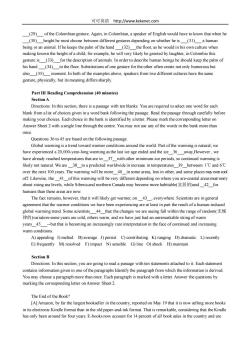
可可英语http:/www.kekenet.com (29)of the Colombian gesture.again.in Colombian.a speaker of English would have to know that when he (30)height he most choose between different gestures depending on whether he is(31a human being or an animal.If he keeps the palm of the hand (32)the floor,as he would in his own culture wher making known the height of a child,for example,he will very likely be greeted by laughter,in Colombia this gesture is (33)for the description of animals.In order to describe human beings he should keep the palm of his hand (34)to the floor.Substitutions of one gesture for the other often create not only humorous but also_(35) moment.In both of the examples above,speakers from two different cultures have the same gesture,physically,but its meaning differs sharply. Part III Reading Comprehension (40 minutes) Section A Directions:In this section,there is a passage with ten blanks You are required to select one word for each blank fromalis of choices given ina word bank following the p ae.Read the p through carefully before making your choices.Each choice in the bank is identified by aletter.Please mark the corresponding letter on Answer Sheet 2 with a single line through the centre.You may not use any of the words in the bank more than once. Questions 36 to45 are based on the following p ssage. Glohal w toward warmer con ons around the world.Part of the warming is natural we have r-ya-onaingth ad the c _36away,However,we have already reached temperatures that are in37 with other minimum-ice periods,so continued warming is likely not natural.We are 38 to a predicted worldwide in increase in temperatures 39 betweem IC and 6C over the next 100 vears.The warming will be more 40 in some areas.less in other.and some places mav even cool off.Likewise,the41of this tal aren bout rising levels,while Siberiand northem Canada may become more habitable(a and 42 for humans than these areas are now The fact remains.however.that it will likely get warmer.on 43 everywhere.Scientists are in general agreement that the warmer conditions we have been experiencing are at least in part the result of a human-induced obal warr 的0 wend Sompscnti4a山echngare se0 fall within the r@ne ofrandom无想 we have just hada years 45 -but that is becoming n increasinglyrare interpretation in the face of and increasing warm conditions A)appealing I)melted B)average J)persist C)contributing K)ranging D)dramatic L)recently E)frequently M)resolved F)impact N)sensible G)line O)shock H)maintain Directions:In this section,you are going to read a passage with ten statements attached to it.Each statement contains information given in one of the paragraphs Identify the paragraph from which the information is derived You may choose a paragraph more thanne.Each paragraph is marked with aletterAnswer the qustions by marking the corres onding letter on answer Sheet 2 The End of the Book? [A]Amazon,by far the largest bookseller in the country.reported on May 19 that it is now selling more books in its electronic Kindle format than in the old paper-and-ink format.That is remarkable,considering that the Kindle has only been around for four years E-books now account for 14 percent of all book sales in the country and are
可可英语 http://www.kekenet.com _(29)_ of the Colombian gesture. Again, in Colombian, a speaker of English would have to know that when he _(30)_height he most choose between different gestures depending on whether he is _(31)_ a human being or an animal. If he keeps the palm of the hand _(32)_the floor, as he would in his own culture when making known the height of a child, for example, he will very likely be greeted by laughter, in Colombia this gesture is_(33)_for the description of animals. In order to describe human beings he should keep the palm of his hand _(34)_to the floor. Substitutions of one gesture for the other often create not only humorous but also_(35)_ moment. In both of the examples above, speakers from two different cultures have the same gesture, physically, but its meaning differs sharply. Part III Reading Comprehension (40 minutes) Section A Directions: In this section, there is a passage with ten blanks. You are required to select one word for each blank from a list of choices given in a word bank following the passage. Read the passage through carefully before making your choices. Each choice in the bank is identified by a letter. Please mark the corresponding letter on Answer Sheet 2 with a single line through the centre. You may not use any of the words in the bank more than once. Questions 36 to 45 are based on the following passage. Global warming is a trend toward warmer conditions around the world. Part of the warming is natural; we have experienced a 20,000-year-long warming as the last ice age ended and the ice_36_away,However , we have already reached temperatures that are in _37_with other minimum-ice periods, so continued warming is likely not natural. We are _38_to a predicted worldwide in increase in temperatures_39_betweem 1℃ and 6℃ over the next 100 years. The warming will be more_40_in some areas, less in other, and some places may even cool off. Likewise, the _41_of this warming will be very different depending on where you are-coastal areas must worry about rising sea levels, while Siberia and northern Canada may become more habitable(宜居的)and _42_for humans than these areas are now. The fact remains, however, that it will likely get warmer, on _43_, everywhere. Scientists are in general agreement that the warmer conditions we have been experiencing are at least in part the result of a human-induced global warming trend. Some scientists_44_that the changes we are seeing fall within the range of random(无规 律的)variation-some years are cold, others warm, and we have just had an unremarkable string of warm years_45_-but that is becoming an increasingly rare interpretation in the face of continued and increasing warm conditions. A) appealing I) melted B) average J) persist C) contributing K) ranging D) dramatic L) recently E) frequently M) resolved F) impact N) sensible G) line O) shock H) maintain Section B Directions: In this section, you are going to read a passage with ten statements attached to it. Each statement contains information given in one of the paragraphs Identify the paragraph from which the information is derived. You may choose a paragraph more than once. Each paragraph is marked with a letter. Answer the questions by marking the corresponding letter on Answer Sheet 2. The End of the Book? [A] Amazon, by far the largest bookseller in the country, reported on May 19 that it is now selling more books in its electronic Kindle format than in the old paper-and-ink format. That is remarkable, considering that the Kindle has only been around for four years. E-books now account for 14 percent of all book sales in the country and are
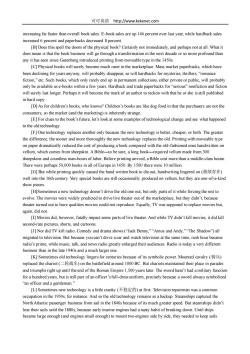
可可英语http:/www.kekenet.com increasing far faster than overall book sales.E-book sales are up 146 percent over last year,while hardback sales Does this spell does mean is that the book business will go through a transformation in the next decade or so more profound than any it has seen since Gutenberg introduced printing from moveable type in the 1450s [CI Physical books will surely become much rarer in the marketplace.Mass market paperbacks,which have for years anway.will probably disappear,as will hardbacks for myster fiction,.”ctc hich ony upin permanent privateor publi will probabl only be available as e-boo ks within a few years.Hardback and trade paperbacks for "serious"nonfiction and fictio will surely last longer.Perhaps it will become the mark of an author to reckon with that he or she is still published in hard copy. [D]As for children's books who knows?Children's books are like dog food in that the purchasers are not the cons ting)is inherently strange ok's futu at some examples of technological change and see what happened to the old technology IF]One technology replaces another only because the new technology is better.cheaper.or both.The greater the difference.the sooner and more thoroughly the new technology replaces the old.Printing with moveable type red with the od-fashioned ones handwritten o h comes from sheepskin. -to be sure,along book quired vellum made from300 sheepskins and countless man-hours of labor.Before printing arrived,a Bible cost more than a middle-class house There were perhaps 50,000 books in all of Europe in 1450.By 1500 there were 10 million. [G]But while printing quickly caused the hand written book to die out,handwriting lingered on() well into the 16th century.Very special books are still occasionally produced on vellum.but they are one-of-a-kind show pi [H]Sometimesa new technology doesn'tdrive theod oneout,but only parts of it while forcing the rest to evolve.The movies were widely predicted to drive live theater out of the marketplace,but they didn't,because theater turned out to have qualities movies could not reproduce.Equally.TV was supposed to replace movies but. n,did not [I]Movies did,ho rate pictures,shorts,and cartoons. [J]Nor did TV kill radio.Comedy and drama shows("Jack Benny,""Amos and Andy,""The Shadow")all migrated to television.But because you can't drive a car and watch television at the same time,rush hour became radio's prime.while music.talk.and news radio greatly enlarged their audiences.Radio is today a very different business than in the late 1940s and a much larger r one [K]Some hnology lingers for nturies bec ause of its symbolic power.Mounted cavalry(骑兵) replaced the chariot(n the battlefield around 10 BC.But chariots maintained their place in parades and triumphs right up until the end of the Roman Empire 1.500 vears later.The sword hasn't had a military function for a hundred years.but is still part of an officer's full-dress uniform.precisely because a sword always symbolized 'an officer and a gentleman." snew technology(不稳定的)afirst Television repairman wasom n for instance.Andso remains asabackup.Steamships captured th North Atlantic passenger business from sail in the 1840s because of its much greater speed.But steamships didn't lose their sails until the 1880s because early marine engines had a nasty habit of breaking down.Until ships became large enough(and engines small enough)to mount two engines side by side,they needed to keep sails
可可英语 http://www.kekenet.com increasing far faster than overall book sales. E-book sales are up 146 percent over last year, while hardback sales increased 6 percent and paperbacks decreased 8 percent. [B] Does this spell the doom of the physical book? Certainly not immediately, and perhaps not at all. What it does mean is that the book business will go through a transformation in the next decade or so more profound than any it has seen since Gutenberg introduced printing from moveable type in the 1450s. [C] Physical books will surely become much rarer in the marketplace. Mass market paperbacks, which have been declining for years anyway, will probably disappear, as will hardbacks for mysteries, thrillers, “romance fiction,” etc. Such books, which only rarely end up in permanent collections, either private or public, will probably only be available as e-books within a few years. Hardback and trade paperbacks for “serious” nonfiction and fiction will surely last longer. Perhaps it will become the mark of an author to reckon with that he or she is still published in hard copy. [D] As for children’s books, who knows? Children’s books are like dog food in that the purchasers are not the consumers, so the market (and the marketing) is inherently strange. [E] For clues to the book’s future, let’s look at some examples of technological change and see what happened to the old technology. [F] One technology replaces another only because the new technology is better, cheaper, or both. The greater the difference, the sooner and more thoroughly the new technology replaces the old. Printing with moveable type on paper dramatically reduced the cost of producing a book compared with the old-fashioned ones handwritten on vellum, which comes from sheepskin. A Bible—to be sure, a long book—required vellum made from 300 sheepskins and countless man-hours of labor. Before printing arrived, a Bible cost more than a middle-class house. There were perhaps 50,000 books in all of Europe in 1450. By 1500 there were 10 million. [G] But while printing quickly caused the hand written book to die out, handwriting lingered on (继续存在) well into the 16th century. Very special books are still occasionally produced on vellum, but they are one-of-a-kind show pieces. [H]Sometimes a new technology doesn’t drive the old one out, but only parts of it while forcing the rest to evolve. The movies were widely predicted to drive live theater out of the marketplace, but they didn’t, because theater turned out to have qualities movies could not reproduce. Equally, TV was supposed to replace movies but, again, did not. [I] Movies did, however, fatally impact some parts of live theater. And while TV didn’t kill movies, it did kill second-rate pictures, shorts, and cartoons. [J] Nor did TV kill radio. Comedy and drama shows (“Jack Benny,” “Amos and Andy,” “The Shadow”) all migrated to television. But because you can’t drive a car and watch television at the same time, rush hour became radio’s prime, while music, talk, and news radio greatly enlarged their audiences. Radio is today a very different business than in the late 1940s and a much larger one. [K] Sometimes old technology lingers for centuries because of its symbolic power. Mounted cavalry (骑兵) replaced the chariot (二轮战车) on the battlefield around 1000 BC. But chariots maintained their place in parades and triumphs right up until the end of the Roman Empire 1,500 years later. The sword hasn’t had a military function for a hundred years, but is still part of an officer’s full-dress uniform, precisely because a sword always symbolized “an officer and a gentleman.” [L] Sometimes new technology is a little cranky (不稳定的) at first. Television repairman was a common occupation in the 1950s, for instance. And so the old technology remains as a backup. Steamships captured the North Atlantic passenger business from sail in the 1840s because of its much greater speed. But steamships didn’t lose their sails until the 1880s, because early marine engines had a nasty habit of breaking down. Until ships became large enough (and engines small enough) to mount two engines side by side, they needed to keep sails
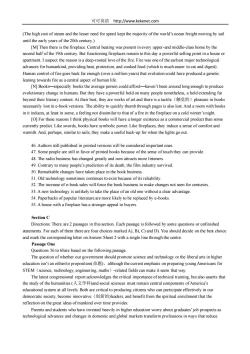
可可英语http:/www.kekenet.com (The high cost of steam and the lesser need for speed kept the majority of the world'socean freight moving by sail ntil theearly years of. [M]Then there is the fireplace.Central heating was present in every upper-and middle-class home by the second half of the 19th century.But functioning fireplaces remain to this day a powerful selling point in a house or apartment.I suspect the reason isa deep-rooted love of the fire.Fire was one of the earliest major technological advances for humankind,providing heat,protection,and cooked food (which is much easier to cat and digest). lening towards aspect ofhuman life [N]Books-especially books the average person could afford-haven't been around long enough to produce evolutionary change in humans.But they have apowerful hold on many people nonetheless,a hold extending far beyond their literary content.At their best,they are works of art and there is a tactile (pleasure in books lost in e-book versions The ability to quickly thumb through pages isals lost.And aroom with books arto that of a fire in the fireplace ona cod winter'snight [For these reasons I think physical books will have alonger existence as a commercial product than some currently predict.Like swords,books have symbolic power.Like fireplaces,they induce a sense of comfort and warmth.And,perhaps,similar to sails,they make a useful back-up for when the lights go out. 6.Authors still published in printed versions will be considered importanto 47.Some favor of printed books because of the of touch they can provide 48.The radio business has changed greatly and now attracts more listeners. 49.Contrary to many people's prediction of its death,the film industry survived. 50.Remarkable changes have taken place in the book business. 51.Old technology s netimes conti ues to exist because of its reliability 52.The increase 53.A new technology is unlikely to take the place of an old one without a clear advantage. 54.Paperbacks of popular literature are more likely to be replaced by e-books. 55.A house with a fireplace has a stronger appeal to buyers Directions:There are passages in thissection.Each passage is followed by some questions or unfinished statements.For each of them there are four choices marked A).B).C)and D).You should decide on the best choice and mark the corresponding letter onAnswer Sheet 2 with a single line through the centre. Passage one Questions 56 to 60are hased on the followin education isn't an either/or proposition(),although the current emphasis on preparing young Americans for STEM (science,technology,engineering.maths)-related fields can make it seem that way. The latest congressional report acknowledges the critical importance of technical training.but also asserts tha the(人文学科 can participate inou democratic society,become innovative ()leaders,and benefit from the spiritual enrichment that the reflection on the great ideas of mankind over time provides Parents and students who have invested heavily in higher education worry about graduates'job prospects as technological advances and changes in domestic and global markets transform professions in ways that reduce
可可英语 http://www.kekenet.com (The high cost of steam and the lesser need for speed kept the majority of the world’s ocean freight moving by sail until the early years of the 20th century.) [M] Then there is the fireplace. Central heating was present in every upper-and middle-class home by the second half of the 19th century. But functioning fireplaces remain to this day a powerful selling point in a house or apartment. I suspect the reason is a deep-rooted love of the fire. Fire was one of the earliest major technological advances for humankind, providing heat, protection, and cooked food (which is much easier to cat and digest). Human control of fire goes back far enough (over a million years) that evolution could have produced a genetic leaning towards fire as a central aspect of human life. [N] Books—especially books the average person could afford—haven’t been around long enough to produce evolutionary change in humans. But they have a powerful hold on many people nonetheless, a hold extending far beyond their literary content. At their best, they are works of art and there is a tactile(触觉的)pleasure in books necessarily lost in e-book versions. The ability to quickly thumb through pages is also lost. And a room with books in it induces, at least in some, a feeling not dissimilar to that of a fire in the fireplace on a cold winter’s night. [O] For these reasons I think physical books will have a longer existence as a commercial product than some currently predict. Like swords, books have symbolic power. Like fireplaces, they induce a sense of comfort and warmth. And, perhaps, similar to sails, they make a useful back-up for when the lights go out. 46. Authors still published in printed versions will be considered important ones. 47. Some people are still in favor of printed books because of the sense of touch they can provide. 48. The radio business has changed greatly and now attracts more listeners. 49. Contrary to many people’s prediction of its death, the film industry survived. 50. Remarkable changes have taken place in the book business. 51. Old technology sometimes continues to exist because of its reliability. 52. The increase of e-book sales will force the book business to make changes not seen for centuries. 53. A new technology is unlikely to take the place of an old one without a clear advantage. 54. Paperbacks of popular literature are more likely to be replaced by e-books. 55. A house with a fireplace has a stronger appeal to buyers. Section C Directions: There are 2 passages in this section. Each passage is followed by some questions or unfinished statements. For each of them there are four choices marked A), B), C) and D). You should decide on the best choice and mark the corresponding letter on Answer Sheet 2 with a single line through the centre. Passage One Questions 56 to 60are based on the following passage. The question of whether our government should promote science and technology or the liberal arts in higher education isn’t an either/or proposition(命题),although the current emphasis on preparing young Americans for STEM(science, technology, engineering, maths)-related fields can make it seem that way. The latest congressional report acknowledges the critical importance of technical training, but also asserts that the study of the humanities (人文学科)and social sciences must remain central components of America’s educational system at all levels. Both are critical to producing citizens who can participate effectively in our democratic society, become innovative(创新的)leaders, and benefit from the spiritual enrichment that the reflection on the great ideas of mankind over time provides. Parents and students who have invested heavily in higher education worry about graduates’ job prospects as technological advances and changes in domestic and global markets transform professions in ways that reduce
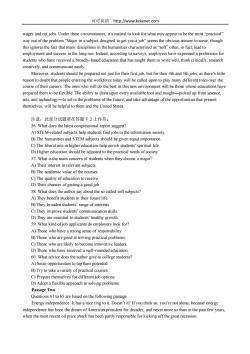
可可英语htp:/www.kekenet.com wages and cut jobs.Under these circumstances,it's natural to look for what may appear to be the most"practical" ou ofthe problem"Major in toget youa the obvious answer tosome.though ofen,in fact,leadt employment and success in the long run.Indeed,according to surveys,employers have expressed a preference for students who have received a broadly-based education that has taught them to write well.think critically.research creatively.and communicate easily. Moreover.students should be prepared not just for their first job.but for their 4th and 5th jobs.as there'slitt les over the aaty suoneonpa asoym asoul aq llm juawuonaua Mau siu ul saq au op lm oum prepared them to be flexible.The ability to draw upon every available tool and insight-picked up from science arts,and technology-to solve the problems of the future,and take advantage of the opportunities that present themselves,will be helpful to them and the United States. 注意:此部分试题请在答题卡2上作答 56.What does the latest congressional report suggest? A)STEM-related subjects help students find jobs in the information society B)The humanities and STEM subjects should be given equal importance. C)The liberal arts in higher education help enrich students s'spiritual life D)Higher education should be adjusted to the pra ctical needs 57.What is the main concern of students when they choose a major A)Their interest in relevant subjects B)The academic value ofthe courses C)The quality of education to receive D)Thei hances of job 58.What does the author say about the so called soft subjects? A)They benefit students in their future life. B)They broaden students'range of interests C)They improve students'communication skills D)They ar 59.What kind ofjob applicants do employersoo for? A)Those who have a strong sense of responsibility b)Those who are good at solving practical problems C)Those who are likely to hecome innovative leaders D)Those who have received a well-rounded education A)Seize opportunities to tap their potentia B)Try to take a variety of practical courses. C)Prepare themselves for different job options. d)Adopt a flexible approach to solving problems Two Energy independence.It has a nice ring to it.Doesn't it?If you think so,you're not alone,because energy independence has been the dream ofAmerican president for decades,and never more so than in the past few years, when the most recent oil price shock has been partly responsible for kicking offthe great recession
可可英语 http://www.kekenet.com wages and cut jobs. Under these circumstances, it’s natural to look for what may appear to be the most “practical” way out of the problem “Major in a subject designed to get you a job” seems the obvious answer to some, though this ignores the fact that many disciplines in the humanities characterized as “soft” often, in fact, lead to employment and success in the long run. Indeed, according to surveys, employers have expressed a preference for students who have received a broadly-based education that has taught them to write well, think critically, research creatively, and communicate easily. Moreover, students should be prepared not just for their first job, but for their 4th and 5th jobs, as there’s little reason to doubt that people entering the workforce today will be called upon to play many different roles over the course of their careers. The ones who will do the best in this new environment will be those whose educations have prepared them to be flexible. The ability to draw upon every available tool and insight—picked up from science, arts, and technology—to solve the problems of the future, and take advantage of the opportunities that present themselves, will be helpful to them and the United States. 注意:此部分试题请在答题卡 2 上作答。 56. What does the latest congressional report suggest? A) STEM-related subjects help students find jobs in the information society. B) The humanities and STEM subjects should be given equal importance. C) The liberal arts in higher education help enrich students’ spiritual life. D) Higher education should be adjusted to the practical needs of society. 57. What is the main concern of students when they choose a major? A) Their interest in relevant subjects. B) The academic value of the courses. C) The quality of education to receive. D) Their chances of getting a good job. 58. What does the author say about the so called soft subjects? A) They benefit students in their future life. B) They broaden students’ range of interests. C) They improve students’ communication skills. D) They are essential to students’ healthy growth. 59. What kind of job applicants do employers look for? A) Those who have a strong sense of responsibility. B) Those who are good at solving practical problems. C) Those who are likely to become innovative leaders. D) Those who have received a well-rounded education. 60. What advice does the author give to college students? A) Seize opportunities to tap their potential. B) Try to take a variety of practical courses. C) Prepare themselves for different job options. D) Adopt a flexible approach to solving problems. Passage Two Questions 61 to 65 are based on the following passage. Energy independence. It has a nice ring to it. Doesn’t it? If you think so, you’re not alone, because energy independence has been the dream of American president for decades, and never more so than in the past few years, when the most recent oil price shock has been partly responsible for kicking off the great recession
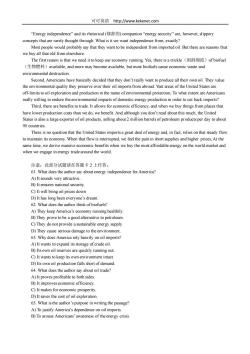
可可英语http:/www.kekenet.com "Energy independence"and its rhetorical (companion"energy security"are,however,slippery we buy all that old from elsewhere. The first reason is that we need it to keep our economy running Yes there is a trickle (of biofuel (生物燃料)available,and more may become available,but most biofuels cause economic waste and nd,Americans have basically decided that they don'treally want their owno They value the environmental quality they preserve over their oil imports from abroad.Vast areas of the United States are off-limits to oil exploration and production in the name of environmental protection.To what extent are Americans really willing to endure the environmental impacts of domestic energy production in order to cut back imports? Third,there are benefits to trade.It allows for economic efficiency,and when we buy things from places that gh you don'tread about this much,the United States is also a large exporter of oil products,selling about 2 million barrels of petroleum products per day to abou 90 countries. There is no question that the United States imports a great deal of energy and,in fact,relies on that steady flow tomaintain itsmy.When that flow is interrupted,we feel the pain in short suppies andhigher pricesAt the ame time,we derive massiv nomic benefits when we buy the energy on the world market and when we engage in energy trade around the world. 注意:此部分试题请在答题卡2上作答 61.What does the author say about energy independence for America? A)It sounds very attractive B)Iten C)It will bring oil prices down D)It has long been everyone's dream. 62.What does the author think of biofuels? B)They provetobe C)They do not provide asustainable energy supply D)They cause serious damage to the environment. 63.Why does America rely heavily onoil imports? A)It wants to expand its storage of crude oil B)Itsown oil reserves are quickly runnin C)It wants to keep its own environmer D)Its own oil production falls short of demand 64.What does the author say about oil trade? A)It proves profitable to both sides D)It saves the cost of oil exploration 65.What is the author's purpose in writing the passage? A)To justify America's dependence on oil imports. B)To arouse Americans'awareness of the energy crisis
可可英语 http://www.kekenet.com “Energy independence” and its rhetorical (修辞的) companion “energy security” are, however, slippery concepts that are rarely thought through. What is it we want independence from, exactly? Most people would probably say that they want to be independent from imported oil. But there are reasons that we buy all that old from elsewhere. The first reason is that we need it to keep our economy running. Yes, there is a trickle(涓涓细流)of biofuel (生物燃料)available, and more may become available, but most biofuels cause economic waste and environmental destruction. Second, Americans have basically decided that they don’t really want to produce all their own oil. They value the environmental quality they preserve over their oil imports from abroad. Vast areas of the United States are off-limits to oil exploration and production in the name of environmental protection. To what extent are Americans really willing to endure the environmental impacts of domestic energy production in order to cut back imports? Third, there are benefits to trade. It allows for economic efficiency, and when we buy things from places that have lower production costs than we do, we benefit. And although you don’t read about this much, the United States is also a large exporter of oil products, selling about 2 million barrels of petroleum products per day to about 90 countries. There is no question that the United States imports a great deal of energy and, in fact, relies on that steady flow to maintain its economy. When that flow is interrupted, we feel the pain in short supplies and higher prices, At the same time, we derive massive economic benefits when we buy the most affordable energy on the world market and when we engage in energy trade around the world. 注意:此部分试题请在答题卡 2 上作答。 61. What does the author say about energy independence for America? A) It sounds very attractive. B) It ensures national security. C) It will bring oil prices down D) It has long been everyone’s dream. 62. What does the author think of biofuels? A) They keep America’s economy running healthily. B) They prove to be a good alternative to petroleum. C) They do not provide a sustainable energy supply. D) They cause serious damage to the environment. 63. Why does America rely heavily on oil imports? A) It wants to expand its storage of crude oil. B) Its own oil reserves are quickly running out. C) It wants to keep its own environment intact. D) Its own oil production falls short of demand. 64. What does the author say about oil trade? A) It proves profitable to both sides. B) It improves economic efficiency. C) It makes for economic prosperity. D) It saves the cost of oil exploration. 65. What is the author’s purpose in writing the passage? A) To justify America’s dependence on oil imports. B) To arouse Americans’ awareness of the energy crisis
按次数下载不扣除下载券;
注册用户24小时内重复下载只扣除一次;
顺序:VIP每日次数-->可用次数-->下载券;
- 《大学英语读写》课程教学资源(A)Ⅱ_大学英语读写(A)Ⅱ_学术英语写作_Academic Wrting ——Summary and paraphrasing.ppt
- 《大学英语读写》课程教学资源(A)Ⅱ_大学英语读写(A)Ⅱ_写作技巧训练_下定义写作.ppt
- 《大学英语读写》课程教学资源(A)Ⅱ_大学英语读写(A)Ⅱ_英语演讲_英语演讲技巧(Methods of delivery).ppt
- 《大学英语读写》课程教学资源(A)Ⅱ_大学英语读写(A)Ⅱ_英语演讲_英语演讲写作——开头和主体.ppt
- 《大学英语读写》课程教学资源(A)Ⅱ_大学英语读写(A)Ⅱ_英语演讲_英语演讲写作——结尾(conclusion).ppt
- 《大学英语读写》课程教学资源(A)Ⅱ_大学英语读写(A)Ⅱ_英语演讲_演讲——how to write a hook.ppt
- 《大学英语读写》课程教学资源(A)Ⅱ_大学英语读写(A)Ⅱ_步进PPT_Unit 1 discover yourself.ppt
- 《大学英语读写》课程教学资源(A)Ⅱ_大学英语读写(A)Ⅱ_步进PPT_Unit 3 art for art's sake.ppt
- 《大学英语读写》课程教学资源(A)Ⅱ_大学英语读写(A)Ⅱ_步进PPT_Unit 5 A place in society.ppt
- 《大学英语读写》课程教学资源(A)Ⅱ_大学英语读写(A)Ⅱ_步进PPT_Unit 8 high days and holiday.ppt
- 《大学英语读写》课程教学资源(A)Ⅱ_大学英语读写(A)Ⅱ_词汇拓展_Unit 1 词汇拓展 catch crabs.ppt
- 《大学英语读写》课程教学资源(A)Ⅱ_大学英语读写(A)Ⅱ_词汇拓展_Unit 3 词汇拓展 how to listen to music.ppt
- 《大学英语读写》课程教学资源(A)Ⅱ_大学英语读写(A)Ⅱ_词汇拓展_Unit 5 词汇拓展.ppt
- 《大学英语读写》课程教学资源(A)Ⅱ_大学英语读写(A)Ⅱ_词汇拓展_Unit 8 词汇拓展 Chinese or Western, it's a time to relax.ppt
- 《大学英语读写》课程教学资源(A)Ⅱ_大学英语读写(A)Ⅱ_词汇拓展_Unit 9 词汇拓展.ppt
- 《大学英语读写》课程教学资源(A)Ⅱ_大学英语读写(A)Ⅱ_口语活动指南(如何设计问卷问题及访谈)7 tips for writing a great survey.doc
- 《大学英语读写》课程教学资源(A)Ⅰ_大学英语读写Ⅰ_步进教学PPT_Unit 1 college culture.ppt
- 《大学英语读写》课程教学资源(A)Ⅰ_大学英语读写Ⅰ_步进教学PPT_Unit 3 crime Watch.ppt
- 《大学英语读写》课程教学资源(A)Ⅰ_大学英语读写Ⅰ_步进教学PPT_Unit 4 cultural awareness.ppt
- 《大学英语读写》课程教学资源(A)Ⅰ_大学英语读写Ⅰ_步进教学PPT_Unit 8 time off.ppt
- 《大学英语读写》课程教学资源(A)Ⅱ_大学英语读写(A)Ⅱ_四级考试材料_2013年12月四级考试真题第二套及答案详解.doc
- 《大学英语读写》课程教学资源(A)Ⅱ_课前拓展_Unit 3 词汇拓展.ppt
- 《大学英语读写》课程教学资源(A)Ⅱ_课前拓展_Unit 1 词汇拓展.ppt
- 《大学英语读写》课程教学资源(A)Ⅱ_大学英语读写(A)Ⅱ_Preview of AR1Unit1.pdf
- 《大学英语读写》课程教学资源(A)Ⅱ_大学英语读写(A)Ⅱ_Teaching Plan for College English learning 2.pdf
- 《大学英语读写》课程教学资源(A)Ⅰ_大学英语学习导论2016_大学英语学习导论.ppt
- 《大学英语读写》课程教学资源(A)Ⅰ_大学英语读写第2册_Unit 4_words and expressions.ppt
- 《大学英语读写》课程教学资源(A)Ⅰ_大学英语读写第2册_Unit 4_text translation.ppt
- 《大学英语读写》课程教学资源(A)Ⅰ_大学英语读写第2册_Unit 4_background information.ppt
- 《大学英语读写》课程教学资源(A)Ⅰ_大学英语读写第2册_Unit 8_text translation.ppt
- 《大学英语读写》课程教学资源(A)Ⅰ_大学英语读写第2册_Unit 8_words and expressions.ppt
- 《大学英语读写》课程教学资源(A)Ⅰ_大学英语读写第2册_Unit 8_information related.ppt
- 《大学英语读写》课程教学资源(A)Ⅰ_大学英语读写第2册_Unit 9_text translation.ppt
- 《大学英语读写》课程教学资源(A)Ⅰ_大学英语读写(A)Ⅰ Book2_授课课件_Unit 8 课件.pdf
- 《大学英语读写》课程教学资源(A)Ⅰ_大学英语读写(A)Ⅰ Book2_授课课件_Unit 5 课件.ppt
- 《大学英语读写》课程教学资源(A)Ⅰ_大学英语读写(A)Ⅰ Book2_授课课件_Unit 4 课件.ppt
- 《大学英语读写》课程教学资源(A)Ⅰ_大学英语读写(A)Ⅰ Book2_授课课件_Unit 1课件.ppt
- 《大学英语读写》课程教学资源(A)Ⅰ_大学英语读写(A)Ⅰ Book2_授课课件_语音讲解.pdf
- 《大学英语读写》课程教学资源(A)Ⅰ_大学英语读写(A)Ⅰ Book2_课文翻译参考_Unit 5 课文翻译.ppt
- 《大学英语读写》课程教学资源(A)Ⅰ_大学英语读写(A)Ⅰ Book2_课文翻译参考_Unit 4 课文翻译.ppt
